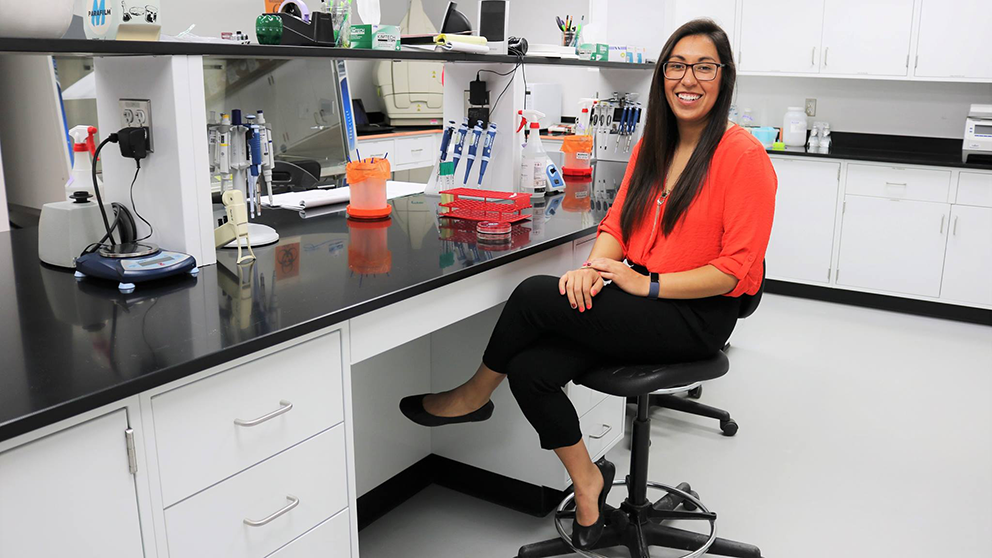
Ten years on, an SSP alumna reflects with gratitude on (finally) finding a place to belong.
When Erika Estrada was accepted to the JAX Summer Student Program, she went in search of a map.
She’d never been to Maine. She hadn’t even left California since emigrating there from Mexico at age 17, alone, with one goal in mind: getting a college education.
Erika grew up in a small town in southwest Mexico with no traffic lights and few opportunities to pursue a secondary education, especially as a woman.
“In my hometown, most young women finished high school, got married and started families,” she said. “I wanted more than that.”
She moved to California to stay with extended family and embarked on her senior year at an American high school. Her new school had a fully stocked library, a gym, even a pool – resources she never had access to in Mexico. But facing a language barrier and social disadvantage as a senior relegated to introductory English classes, she struggled to feel she belonged in her new life.
Erika still graduated and transitioned to a nearby community college, where she made two life-changing decisions: she told her family she wouldn’t be returning to Mexico, and she took her first microbiology course. It captured her attention.
“The language barrier made writing more of a challenge for me,” she said. “Numbers and science were easier to grasp and understand.”
Perhaps noticing her potential, one of her professors suggested she pursue opportunities to conduct research. She applied for several internship programs and landed at JAX in the summer of 2014.
‘Far behind compared to everyone else’
During her first weeks at the Highseas estate, where SSP trainees reside for the summer, Erika once again faced the sensation of feeling apart from the crowd. Some of her classmates were children of doctors and scientists who came from private and Ivy League schools. Many had already completed research internships and job shadowed with mentors.
“I felt like I didn’t belong,” she said. “I seemed so far behind, compared to everyone else.”
But as she grew into a routine of living and working with her JAX classmates, she felt those differences fall away and found they all had more in common than not. She realized how much they could learn from each other. The immersive quality of the SSP – made possible in large part through gifts like yours – created an environment ideal for lifelong connections.
Through a summer of camping trips, whitewater rafting, after-dinner hikes and rounds of ping-pong with friends as passionate about science as she was, Erika at long last found what she’d been searching for – a sense of belonging.
She also found comfort and confidence in the mentorship of JAX Associate Professor Ron Korstanje, Ph.D., who served as the program’s resident supervisor and lived with his family at Highseas that summer. His example helped her begin to see a place for herself in the scientific community.
“I saw Ron balancing life as a father and husband with his life as a scientist,” she said. I thought ‘If he can have that, so can I.’”
In the end, her most important lesson of the summer was learning to believe in herself.
“I learned I could do anything I wanted to do, regardless of where I came from. My journey may take more turns, but I’ll still get there.”
Paying it forward
Erika recently completed her Ph.D. in food science at the University of California, Davis, where she studied food-borne pathogens like Salmonella. Her research involved studying the genetic characteristics of Salmonella to reduce food-born illnesses, specifically in produce.
She’s passionate about making an impact on the younger generation and hopes to inspire others to pursue their goals in the same way she was inspired by those who encouraged her early on. She even hopes to return to Highseas as a resident supervisor one day.
“One of the reasons I pursued my Ph.D. was that I always had amazing mentors,” she said. “And now I have a chance to show people who come from backgrounds like mine that they can still reach their goals.”
Your support has made a difference not only for Erika, but for the many students like her who find their way to JAX despite having fewer advantages and resources.
“I would want you to know that your gift is an investment in the future,” she said. “It allows people like me to access an experience we wouldn’t have had otherwise.”
She noted that diversity of backgrounds and perspectives makes for better discoveries.
“When people from different backgrounds can get exposure to a program like the SSP, their research will be even better because it will have the benefit of diverse perspectives. In supporting JAX’s program, you’re ensuring we’ll have even better research in the future.”